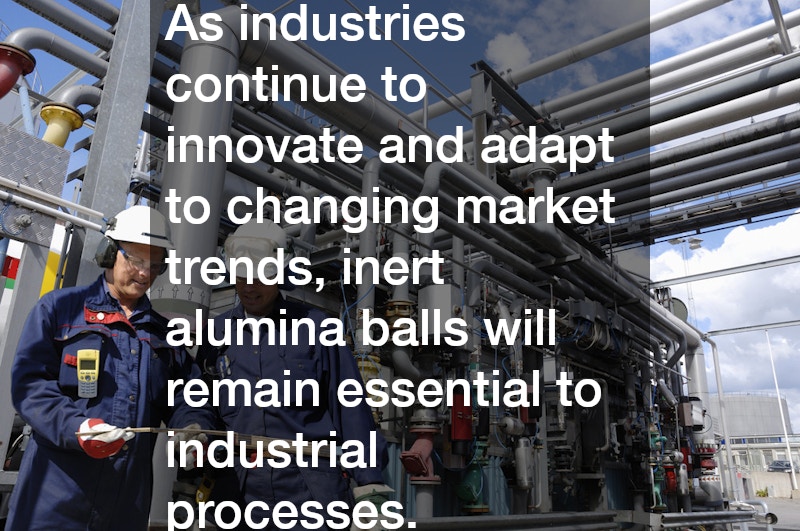Inert alumina balls are a key component in numerous industrial applications, primarily serving as efficient catalysts and adsorbents. Their ubiquitous presence in diverse sectors, ranging from the petrochemical industry to wastewater treatment, underscores their importance in various processes. Engineered for superior thermal and chemical resistance, these spheres continue to be integral in optimizing industry operations and advancing technology.
Understanding the role of inert alumina balls involves delving into their unique properties and the benefits they provide to industrial processes. Their high compressive strength and resistance to thermal shock make them suitable for environments where stability is paramount. As industries worldwide strive for more efficient processes, the role of inert alumina balls becomes increasingly significant.
This article explores the versatile applications of inert alumina balls within industrial processes. Highlighting their usage across various sectors provides insight into why these small yet highly functional components are indispensable. By the end of this exploration, the contribution of inert alumina balls to industrial efficiency and sustainability will be evident.
Applications in the Petrochemical Industry
One of the primary applications of inert alumina balls is in the petrochemical industry, where they play a critical role as catalyst supports. These balls provide a robust surface area that aids in the catalytic reactions essential for refining processes. High-temperature operating conditions in petrochemical plants demand materials that withstand extreme environments, making inert alumina balls optimal due to their thermal resilience.
Besides their stability under high temperatures, inert alumina balls offer excellent mechanical strength. This strength is crucial in preventing any degradation under the weight and pressure of the catalytic particles they support. The use of these balls ensures continuity and efficiency in operations, reducing downtime and maintenance costs.
Another advantage of using inert alumina balls in petrochemical processes is their resistance to chemical corrosion. They do not interact with the chemicals present in the processing environment, maintaining the purity of the catalytic processes. By providing an inert carrier, they decrease the likelihood of unwanted reactions, thereby enhancing product yield and process safety.
Applications in Water Treatment
Inert alumina balls are extensively used in water treatment facilities due to their ability to purify and enhance the quality of water. These balls act as filtration media, removing impurities and particulate matter from water streams. Their high surface area facilitates adsorption, a process essential for eliminating contaminants from input water sources effectively.
The durability and chemical inertness of alumina balls make them ideal for water treatment processes. They ensure that the filtration systems run efficiently and for extended periods without frequent replacements. By improving the robustness of the filtration system, inert alumina balls help maintain a consistent supply of clean water, essential for both municipal use and industrial purposes.
Using inert alumina balls in wastewater treatment not only aids in effective filtration but also supports environmental sustainability. They are crucial in removing harmful industrial effluents, thereby reducing the ecological footprint of wastewater. Given the increasing environmental regulations, integrating inert alumina balls in water treatment processes contributes to achieving compliance and sustainability goals effectively.
Applications in Gas Processing
In the gas processing industry, inert alumina balls serve as a medium for gas purification and separation. These balls are instrumental in the adsorption of moisture and other impurities from gas streams, enhancing the quality of the final product. Their use in natural gas and helium purification processes ensures that the gases meet the stringent quality standards required for commercial distribution.
The robustness of inert alumina balls enables them to function effectively in high-pressure gas environments. This capability is essential for maintaining the efficiency of gas dehydration units where moisture and other components are removed. By providing a stable environment for gas treatment, alumina balls facilitate reliable and continuous operations, minimizing the risk of process interruptions.
Furthermore, the chemical inertness of these alumina-based spheres prevents any unwanted reactions during gas processing. They afford a high degree of reliability and safety, which is crucial in handling volatile and potentially hazardous gases. By ensuring clean and efficient processing, inert alumina balls contribute significantly to the gas industry’s operational excellence.
Inert alumina balls are an integral part of various industrial processes, contributing to efficiency, reliability, and sustainability. Their extensive applications in the petrochemical, water treatment, and gas processing industries highlight their versatility and indispensability. As industries face increasing demands for enhanced operational efficiency and environmental responsibility, the role of inert alumina balls continues to expand and evolve.
The unique properties of inert alumina balls, including their thermal resistance, mechanical strength, and chemical inertness, make them ideal for challenging industrial environments. Their ability to support catalytic reactions and adsorb impurities underlines their contribution to optimizing industrial processes. By facilitating cleaner and more efficient operations, these balls play a pivotal role in advancing industrial technology.
As industries continue to innovate and adapt to changing market trends, inert alumina balls will remain essential to industrial processes. Their ongoing development promises to support the future of industry, providing greater efficiency and reducing environmental impact. Understanding their applications and benefits is crucial for any industry professional seeking to optimize processes and future-proof their operations.
.






